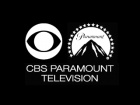|
|
Culture Basics
HONOR AND DISHONOR AMONG THE KLINGONS
by Michael J. Caruso
“A Klingon’s honor means more to him than his life.” This statement was made by Kurn, son of Mogh, to his elder brother, Worf. Perhaps a more accurate statement would have been, “A true Klingon’s honor means more to him than his life.” Why say this? Are there not many Klingons in the Star Trek universe portrayed as greatly lacking in honor?
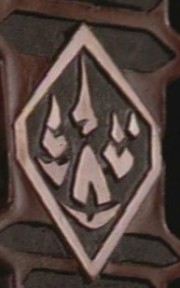 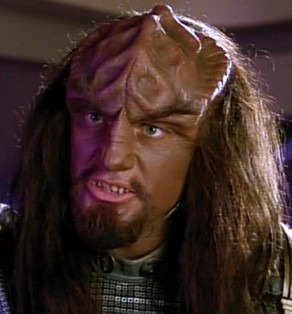 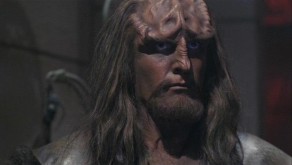
The House of Duras
We see this as a recurring theme throughout the latter day Star Trek series, from the House of Duras’ treachery (of which we had learned moments after Kurn spoke the quote earlier cited to him), on to Korath, who altered the terms of his agreement with Admiral Janeway, who had already made good her end of the deal, by demanding the shield technology her shuttlecraft possessed.
Klingons have not always been a race associated with honor. Kronos was once a planet ruled by a cruel people, a people who ran roughshod over the weaker among them. This remained the status quo, until a time came in the 9th century (all dates given are Terran), when a Klingon with an honorable soul rebelled against a leader who had given the order to slaughter those who could not afford to pay the outrageous tribute he had demanded. Taxes that would have left villages to die slow deaths from starvation, while the warlord and his men lived an opulent lifestyle.
After the day of that warlord’s defeat, the dictates of honor grew to be a part of all aspects of Klingon life as well as in the battlefield. A Klingon’s word, in the business place and all other aspects of life, was as good as a written contract.
In the centuries that followed the defeat of the warlord, a Klingon’s actions not only came to reflect upon his own honor, but also upon the honor of his family. All shared in the glorious deeds of their clansmen and clanswomen. The honors brought to their Houses also carried with them an increase in political strength as well as prestige.
As it is with most things, along with the Yin, there is also the accompanying Yang. For the Klingon Houses not only shared in the glories, but also in the ignominy wrought by their members. While the power and prestige that a House may hold might have taken decades or even centuries to achieve, a single clan-member’s act of cowardice or treachery could lead to the loss of their honor and their position in the Empire for many generations to come.
Klingons not only respect honor within their own society, they admire any person or race that exhibits that very same trait. When the Narr attacked the Klingon agricultural colony on Signi Beta and the U.S.S. Enterprise, under the command of Captain James T. Kirk, came to their aid, the Klingons on that agricultural colony were shocked that the Terrans fought at their sides, in defense of the settlement. It must have seemed very odd to them, especially since the Klingon Empire and the United Federation of Planets had been in a contest to see which of them would colonize the planet.
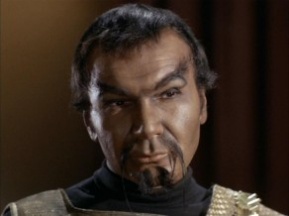 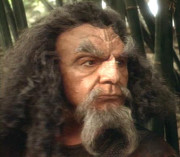
Commander Kor had once told Kirk that he was disappointed that the Organians had put a halt to an impending war. He would have reveled in the glory. How difficult it must have been for him to fight alongside his one-time adversary, but the truly honorable Kor rose above his prejudices and, through no little effort of Kirk’s, the Klingons and the Narr (who the Klingons found to be honorable warriors, also) discovered common ground and were able to cease hostilities. So impressed were the Klingons that an enemy of the Empire would go to such lengths when answering a distress call from a Klingon colony, that they set aside the anniversary of those days on Signi Beta as the Day of Honor celebration throughout the Klingon Empire. It is a time of great revelry and festivals, but most of all it is a reminder that even ones enemies may possess and act with the same sense of honor as that of a Klingon.
According to Klingon mytho-historical legends, Kahless, the rebel who overthrew the tyrant Molor, was a simple warrior. He wanted no more than to serve his leader and live the life of a warrior. He was a skilled fighter and a clever strategist. But beneath the savagery, his heart held a burning knowledge of right and wrong, along with an innate sense of honor. Kahless may have needed his warrior-brother, Morath, to goad him into doing the right thing, but, once he started on the glory road, there was nothing that would stop him.
Not so was the tyrant, Molor. Fierce and vicious, he may have been, but not within. Within, he was much like any bully, a coward. After years of fighting, Kahless and Molor once again came face to face. Molor had aged fast and hard from the stress and worry that the rebellion had brought him. Where he once might have been more than Kahless’ equal in a fight, he was no longer a match for his one-time officer. In the end, he showed further lack of honor by trying to defeat Kahless through deceit.
Molor may not have been the first Klingon without honor and Kahless may not have been the first honorable Klingon, still, they are excellent examples of both ends of the spectrum.
A fine example of an honorable House, contrasted with a dishonorable house, is the House of Mogh compared to the House of Duras. The only thing that could be said to be greater than the House of Mogh’s sense of honor was its loyalty to the Klingon Empire and his friends. When honor called and Mogh came to the aid of the House of Huraga during their blood feud with the House of Duras, he unknowingly set into motion a chain of events that would end in the House of Mogh becoming falsely dishonored through the guile and deceit of the House of Duras.
Many years after being defeated by the combined strength of those two Houses, Ja’rod, the leader of the House of Duras, orchestrated his revenge against the House of Mogh through his betrayal of the Klingon Empire to the Romulan Star Empire. Ja’rod supplied the Romulans with the information needed for a successful surprise attack on Khitomer in 2346. Mogh and his wife were both killed in the raid. Worf, son of Mogh, was the only known survivor of the attack, Mogh’s infant son, Kurn, who was under the care of friends in the House of Noggra, also survived in secrecy for many years. Ja’rod escaped the massacre by cowardly fleeing shortly before the attack began.
The dishonor of the House of Duras did not stop with Ja’rod. Duras, the son of Ja’rod, compounded the transgressions of his family, about twenty years later, by falsely accusing the House of Mogh for his own House’s traitorous actions. When the Sons of Mogh were reunited aboard the U.S.S. Enterprise, Kurn informed Worf of the Duras’ plot to dishonor their House. With the aid of Captain Picard, Worf was able to untangle the web of deceit and discover that the truth was already known to key persons in the Klingon High Council.
Realizing that making this deception known to the entirety of the Empire would have dire consequences throughout all Klingon worlds, perhaps the end result being civil war, Worf opted for Discommendation. This meant that Worf, alone, since none of the High Council knew Kurn’s true identity, would take the brunt of this false dishonor. Stripped of his honor, labeled a coward and essentially a pariah and non-entity in the Klingon Empire, Worf bided his time looking forward to day that he would be able to right the wrongs perpetrated by the House of Duras and reinstate the House of Mogh to its rightful place in the Empire.
That sacrifice, more than all the other acts attributed to Worf, is evidence of the depths to which the roots of Worf’s honor reach. Being willing to bear that shame and ouster from Klingon society, while all the time knowing that those who orchestrated the entire situation were those who were truly at fault, demands a great deal of character.
In the year 2367, Duras, son of Ja’rod, sunk even deeper into the mire of dishonor by slowly poisoning K’mpec, Chancellor of the Klingon High Council, in attempt to set himself at the reins of the Empire. With all the players on board the U.S.S. Enterprise it seems that it was inevitable that the truth would come out. As it was, K’Ehleyr and Alexander, Worf’s mate and their young son, were part of the scenario. K’Ehleyr discovered the facts behind Worf’s Discommendation and was slain by Duras in a feeble and ill-advised attempt to maintain the cover-up. Worf claimed the Klingon “Right of Vengeance” and easily dispatched the traitorous Duras. This eased the way for Gowron, the only other challenger for the position of Chancellor, to rise to the office.
The Houses of Mogh and Duras exemplify the polar extremes of the dichotomy of honor that exists within the Klingon culture.
Gowron became the Chancellor of the Klingon High Council in the year 2367. Much intrigue surrounded the passing of the Chancellor’s mantle. Duras had poisoned K’mpec and nearly succeeded in implicating Gowron as the architect of the cowardly deed. Duras later sought to kill Gowron, but failed in the attempt.
Further controversy over the installation of Gowron brought the Klingon Empire into a civil war, the opposition being lead by Lursa and B’Etor, the sisters of Duras. With the help of Worf, his brother, Kurn and the United Federation of Planets’ unveiling a Romulan connection to the House of Duras, Gowron finally sat in the Great Hall as the uncontested leader of the Empire.
Worf’s years of waiting had finally come to an end. The House of Mogh had its honor returned and its place in the Empire was reinstated. The House of Duras was, at long last, known to the entire Empire for being the traitors that they had been for so many years and still were to that day.
For the next few years it was business as usual for the Klingon Empire. Gowron ran the Empire well. But we soon saw the first inkling of his lack of honor when he re-wrote parts of the history of the Klingon Civil War, lessening the contributions of the Sons of Mogh and Captain Picard and bolstering his own. In other words, Gowron was a typical politician.
When the Dominion of the Gamma Quadrant began spoiling for a fight, Gowron looked to Martok, son of Urthog, to be his military advisor. But, unknown to anyone, Martok was a Dominion prisoner and Gowron’s advisor was a Dominion spy, a Changeling, bent upon leading the Empire into ruin. Once the ruse had been uncovered and Martok escaped from the internment camp, along with Worf, the Cardassian, Garak and Dr. Julian Bashir, he was put in command of a warship, the I.K.S. Rotarran. He was initially a bit timid as the captain of this vessel, which may be attributed to his time as a Dominion prisoner. But, with the help of Worf, he soon took control of himself and the situation. Martok thrived in this environment and, to most of the Klingon Empire, soon became the consummate hero of the Dominion War.
Being the paranoid politician that he was, Gowron perceived General Martok as a threat to his power and a competitor for his position as Chancellor. Gowron, who had shown another facet of his lack of true honor when he cowardly killed a challenger, virtually using Worf as a shield while Worf was trying to halt the fight, rather than step back until Worf had gotten out of the way, furthered his dishonor by taking over the position as leader of the fleet from Martok and purposely sending Martok on missions that might cost him his life, along with the lives of many other members and ships of the Klingon Defense Force.
This not only gives evidence of Gowron’s lack of honor, it shows him to be a terrible judge of character. Where others saw a Klingon whose most intimate desires were to protect and serve the Empire, Gowron only saw someone who was admired by the majority of the Klingon people, someone who was a better soldier and a better Klingon than he could ever be, and therefore a threat.
Gowron’s greatest nightmare came to life when Worf could no longer stomach the dishonorable actions of the Chancellor. Worf challenged Gowron and handily defeated him, earning the right to the title of Chancellor. But Worf had no desire to be the leader of the Klingon Empire and he put forth the argument that Martok (perhaps the only one who coveted the office less than Worf) was the only and correct choice to be Gowron’s successor. One would think that this would all bode well for the Klingon Empire, but there was another Klingon, one without the slightest shred of honor, who was soon to make an indelible impression upon Martok’s life… his illegitimate son, Morjod.
|
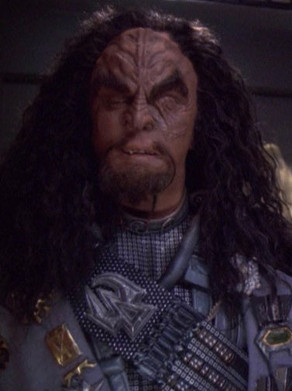
On the day of Martok’s installment as Chancellor, Morjod launched a sneak attack upon the First City. This attack destroyed the Great Hall and the vast majority of the members of the Klingon High Council. Morjod then easily took over the control of the government. He showed no shame in using brain-washing technology to turn the public into virtual slaves. He went so low as to use Klingons to create pseudo-Hur’q soldiers. Defiling Klingon bodies with Hur’q DNA, in order to resurrect the hated creatures, may have been the actions of his mother, Gothmara, but Morjod was the one who paraded them around as his own personal bodyguards.
Both Gothmara and Morjod were entirely insane. Some may contend that their insanity was the cause of their dishonorable actions. Other would say that their insanity was just an extension of the innate lack of honor that they had forever nurtured within their breasts. When Martok was part of the crew of the I.K.S. Gothspar, the Klingon ship commanded by Gothmara’s father, Kultan, he was in love with her. To be more accurate, he was in love with his idea of her. Once he discovered that she, with Kultan’s blessing, was working on bio-weapons, despite the research having been rejected and ordered ended by the High Council due to the highly dishonorable way they were designed to be used, he was hard pressed to believe that the woman he loved could be so lacking in honor.
Looking your opponents in the eye, giving them an equal chance while facing them, is most honorable. Firing disrupters and torpedoes to obliterate and enemy vessel is honorable, even glorious, if their ship out-gunned yours. But the killing of masses with an unseen biotoxin, bacterium or virus was about as honorless a means of conducting warfare as could be imagined. This discovery horrified Martok. The woman he loved and the commander he admired were criminals in the eyes of the High Council.., criminals and dishonorable cowards who would kill with such vile armaments. When Martok confronted Gothmara, she rendered him unconscious and used the opportunity to impregnate herself with Martok’s child, thus compounding the dishonor of both mother and son.
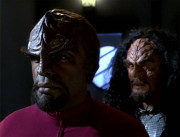
Martok, with the aid of his son, Drex, Kahless (the 24th century clone of the Emperor), Worf, Alexander and many other loyal followers, ultimately defeated the forces of Morjod. While Gothmara, Morjod and the vile Hur’q atrocities were finally eliminated, the personal costs to Martok were far too great. His wife, the incomparable Lady Sirella, his two daughters, Lazhna and Shen, and his new-found companion, an uncharacteristically brave and loyal Ferengi, Pharh were all killed during the conflict. Martok would never cease to mourn their loss. Only his son, Drex, was left to him.
It is safe to assume that the time of Martok’s leadership the Klingon High Council will go on for many years. Perhaps his tenure will even surpass the length of K’mpec’s Chancellorship. If any Chancellor was slated for a long and fruitful term of service it was Martok, for he is not only one of the persons who has acted with the utmost honor in all his deeds and in the service of the Empire, he is supported by the clone of Kahless and Worf. These three have proven their honor time and time again. Often risking life and limb in the pursuit of the Klingon ideals of honor and in striving to keep the Empire on the right track, these three, more than any other Klingons, have had a most major influence in shaping the Empire and preparing it for entry into the 25th century.
The preceding paragraph may seem like an excellent place to end this treatise on Klingon Honor, but there is another Klingon whose bravery, honor and ability to see beyond the range of traditional prejudices and his deep desire to return Klingon society to the level of honor from days past, demands further discourse.
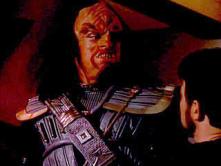
Klag, Son of M’Raq, seemed to have been destined for greatness from is youth. At the age of five he was awarded first place in a Young Warriors Bat'leth Tournament. As a young man, he and his brother, Dorrek, went to live with their great-uncle Nakri on Zakorg and, through his tutelage, became exceptional hunters.
In 2360, M’Raq was captured and imprisoned by the Romulan Star Empire. His father presumed having been killed, Klag, being the oldest son, became the Lord of his House. Five years later, when his father returned to Kronos, a dishonored and broken warrior, who refused to even make any attempt at reclaiming his honor, Klag severed all ties with him and the two neither saw nor spoke to each other after that. M’Raq simply languished in their ancestral home, waiting for death to come to him.
Klag served on a few Klingon vessels, of which the earliest known is the I.K.S. Baruk. Not much is known about his service on the Baruk, except that he once met Chancellor K’mpec aboard that ship.
In 2365, while serving as the First Officer of the I.K.S. Pagh under Captain Kargan, Klag had a minor confrontation with William Riker, who was aboard as part of the Federation/Klingon Officer Exchange Program. Klag immediately contested Riker’s authority with typical Klingon etiquette, and Riker won his respect by reacting with proper Klingon etiquette. Riker asserted his authority by slamming Klag into the bulkhead and standing up to him. This showed Klag that Riker had studied Klingon culture and was not one with whom to trifle. It also showed Klag that Riker honored Klingons by learning their ways as best he could. Klag and Riker became lasting friends during Riker’s short stay aboard the Pagh.
Klag served aboard the Pagh for at least ten years. That service being cut short by the Jem’Hadar in 2375, during the latter days of the Dominion War. The only survivor of the Pagh, after it impacted on the surface of Marcan V, he fought and killed seven Jem’Hadar armed only with his mek’leth. A feat that is all the more amazing since Klag had lost much blood along with his right arm in the crash. For these, and many other actions, Klag was given command of the I.K.S. Gorkon and was soon after inducted into the Order of the Bat’leth. About which we will learn more, later.
Upon the death of M’Raq, B’Oraq, the Chief Medical Officer aboard the Gorkon, proposed to Klag that techniques she had observed in Federation medical facilities might be adapted to graft his father’s right arm as a replacement for his lost limb. Klag was, at first, against the whole idea. Then, during the days following, it occurred to him that, by using his father’s arm in the pursuit of honorable deeds in service of the Empire, he may be able to help his father to regain his honor.
At first, the majority of Klingons saw it as a desecration of M’Raq’s body. But, as time wore on, more and more people came to see it in the same light as Klag and B‘Oraq, a means of returning honor to a broken warrior and a way to return injured and maimed Klingons to useful positions in the Klingon Defense Force.
One Klingon who would never see things from this perspective was Dorrek. He would forever see it as a mutilation of their father’s body. So intent was he on seeing Klag as being the dishonorable villain that Dorrek, himself, crept deeper and deeper into dishonor trying to wreak vengeance upon his own brother.
During a campaign to expand the influence of the Empire, Klag met the Children of San-Tarah. Through several skirmishes, it was apparent that the San-Tarah, male and female alike, were formidable warriors, and they displayed a Klingon-like respect for honor. The leader of the Children of San-Tarah proposed that they settle the battle with a triad of contests. Klag agreed to the contests. Each side was victorious in one of the first two trials. This left the fate of the planet to the outcome of a contest between two single combatants. If the San-Tarah’s champion was to win, the Empire would leave them to their own devises. If the Gorkon’s Champion won, the San-Tarah would welcome the trefoil banner of the Klingon Empire to be raised in rule over them. Klag, the Gorkon’s champion lost the combat, largely due to his not being in full control of his new right arm. He admitted his defeat and bade the San-Tarah farewell.
Conspiring with Dorrek, General Talak ordered Klag to renege on his promise to the San-Tarah, and take the planet at all costs. Klag refused and a great battle, both on the surface and in the space around the planet, was fought with thousands of troops and nearly a dozen warships. Seemingly on the losing side, Klag’s forces were able to garner victory.
One of the goals that Klag had expressed, after his induction into the Order of the Bat’leth, was to reinstate the true purpose of the Order. Its initial mandate was to nurture and enforce the maintenance of honor within the Empire. Within each Order of the Bat’leth medallion was a transceiver that was to be used to call its members to aid other members in performing that enforcement. Klag brought that tradition back and it may have well meant the difference between victory and defeat at San-Tarah.
Once again, conspiring this time with their mother, Tarilla, Dorrek plotted to discredit Klag in the eyes of the Empire. Fortunately, they were unsuccessful and Dorrek was executed for his efforts. Klag is still the Captain of the I.K.S. Gorkon, and hopefully will be for many years.
These are, understandably, a mere fraction of the stories in the war between honor and dishonor in the Klingon Empire. Where honor is the ideal, the dishonorable will always slink about in the shadows, trying to undermine their betters. It may not be that the honorable always win out, but with the likes of Kahless, Martok, Worf and Klag, the dictates of honor will forever be seen as the pulsing heart of the Klingon Empire.
Internet Sources
http://en.memory-alpha.org/wiki/Duras,_son_of_Ja'rod
http://en.memory-alpha.org/wiki/Duras,_son_of_Toral
http://en.memory-alpha.org/wiki/Gowron
http://en.memory-alpha.org/wiki/House_of_Duras
http://en.memory-alpha.org/wiki/House_of_Martok
http://en.memory-alpha.org/wiki/House_of_Mogh
http://en.memory-alpha.org/wiki/Kahless_the_Unforgettable
http://en.memory-alpha.org/wiki/Klag_(Lieutenant)
http://en.memory-alpha.org/wiki/Klingon
http://en.memory-alpha.org/wiki/Mogh
http://en.memory-alpha.org/wiki/Worf
http://en.wikipedia.org/wiki/Gowron
http://en.wikipedia.org/wiki/Klingon_culture
http://memory-beta.wikia.com/wiki/Gothmara,_daughter_of_Kultan
http://memory-beta.wikia.com/wiki/Kahless_the_Unforgettable
http://memory-beta.wikia.com/wiki/Klag,_son_of_M'Raq
http://memory-beta.wikia.com/wiki/Morjod,_son_of_Martok
http://www.startrek.com/database_article/Martok
http://www.startrek.com/database_article/durasDuras
http://www.trekcc.org/articles/index.php?articleID=215
Print Sources
Star Trek: Day of Honor: Book Four of Four, 1997, Dean Wesley Smith
& Kristine Katryn Rusch
Star Trek: Deep Space Nine: The Left Hand of Destiny: Book One, 2003,
J. D. Hertzler & Jeffrey Lang
Star Trek: Deep Space Nine: The Left Hand of Destiny: Book Two, 2003,
J. D. Hertzler & Jeffrey Lang
Star Trek: I.K.S. Gorkon: A Dood Day to Die, 2003, Keith R. A. DeCandido
Star Trek: I.K.S. Gorkon: Honor Bound, 2003, Keith R. A. DeCandido
Star Trek: I.K.S. Gorkon: Enemy Territory, 2005, Keith R. A. DeCandido
Star Trek: I.K.S. Gorkon: A Burning House, 2008, Keith R. A. DeCandido
Star Trek: Klingon, 1996, Dean Wesley Smith & Kristine Katryn Rusch
Star Trek: The Next Generation: Day of Honor: Book One of Four, 1997,
Diane Carey
Star Trek: The Next Generation: Kahless, 1994, Michael Jan Friedman
|







